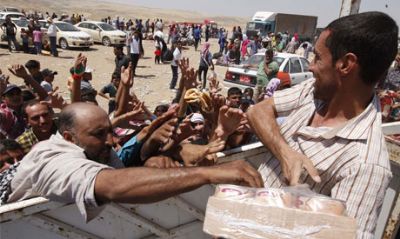"Almost every weekday, tons of lentils, salt, oil and wheat flour are loaded onto an Ilyusin-76 cargo plane at an airport in Jordan. Russian contract pilots then fly nearly 400 miles across the Syrian border and parachute the supplies from about 15,000 feet over the outskirts of a government-controlled neighborhood in Der Ezzor.
The costly air drop operation organized by the World Food Program has saved countless lives in the besieged Sunni-majority city, which has been encircled by hostile forces of the Islamic State for more than three years. But the operation - heavily funded by American and European taxpayers - has also benefited the Syrian regime, and its Russian and Iranian backers, providing a lifeline to a strategic eastern city...
In contrast, Syria has been starving hundreds of thousands of civilians in opposition held towns, imposing an Kafka-esque set of regulations that systematically delay and deny the delivery of food and medicines to those in need. The impediments, U.N. emergency relief coordinator Stephen O'Brien recently told the Security Council, reflects 'a mindset and approach by the government of Syria that uses civilian suffering as a tactic of war.'
"The Syrian government has a big interest in having the U.N. feeding these people in Der Ezzor, because food is loyalty," said Joshua Landis, a Syria expert who heads the Center for Middle East Studies at the University of Oklahoma. 'It reassures the locals that the government, not ISIS, is on their side.'...
The Der Ezzor airdrops are part of a broader humanitarian relief plan brokered by the U.N. special envoy, Staffan de Mistura, and backed by Russia and the United States. The arrangement - which was endorsed by the 17-nation International Syria Support Group, or ISSG, in February, 2016 - placed the burden on key international powers, including the U.S. and Russia, to ensure that combatants on all sides abided by the agreement.
The United States, which has footed the majority of the bill, poured more than $10 million into it its first months of operations, with Britain, Canada, Germany and the Netherlands throwing in several million more. There have been more than 260 airdrops to date, at a total cost of between $36 million and $65 million.
Initially, the pact saw U.N. and Syrian Red Cross convoys delivering food and other goods to towns that had been cut off from basic supplies for years.
'For a few months, it worked really well,' said one State Department official. 'The government provided the approval for the convoys, ensuring that even the government besieged areas received assistance. We were shocked at how well it was working.'
But over time, and as the world's attention turned elsewhere, Syria resumed its policy of blocking aid deliveries to rebel-controlled towns. Those convoys that did get through were required to unload stocks of medicines. 'The initial success had gone down the tubes.'..."
June 22, 2017
U.S. Taxpayers Are Helping Bashar Al-Assad in a Strategic City

Refugees in Syria receiving food aid
Date
June 22, 2017
Title
U.S. Taxpayers Are Helping Bashar Al-Assad in a Strategic City, Foreign Policy
Author(s)
Colum Lynch
Original Source
